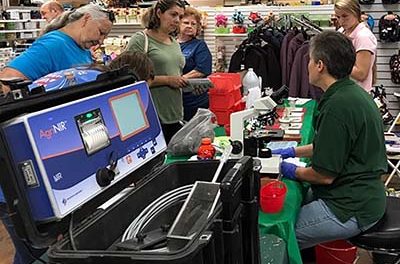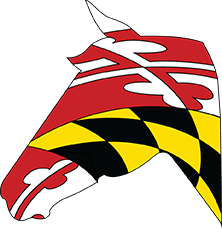The Maryland Horse Council Celebrates 35 Years of One Common Voice
by Katherine O. Rizzo (first published in the March 2020 Equiery)
In the early 1980s, the Maryland horse community was, in essence, fragmented. Special interest groups were organized and attentive within their specific groups, such as trail riders, racehorse trainers, breeders, etc., but rarely worked with other groups even though they all shared many common concerns such as urban sprawl, zoning and liability issues. It became clear to a few individuals in the Southern Maryland area that horse enthusiasts needed to unite in order to have one common voice heard at the government level. Thus, the Maryland Horse Council was formed.
“We all had horses but no one [in Annapolis] had the idea that horses were an industry,” said MHC founding member Dorothy Troutman. “We had to bring everyone together if we wanted to be heard.” Troutman said there was initial resistance to the idea of one horse council speaking for the whole industry but eventually the horse community came together.
Former MHC president LuAnne Levens once wrote in a 2001 newsletter, “There is a real need for a group like the Maryland Horse Council – we’re here to serve all those in league with horses and to get things done.”
“Overall, I would say that the greatest accomplishment of MHC has been to make solid, significant progress in knocking down the ‘silos’ that for generations kept the various segments of the equestrian community and of the horse industry from fully conversing with, understanding and supporting each other,” said former MHC president Jane Seigler.
It was attorney and CPA Sandra Bullington who officially acted as the first MHC president and resident agent. She filed the paperwork to form MHC on July 25, 1985.
The first MHC meeting was held on September 24, 1985, at the Marlboro Country Club. Robert C. Carrico, Ken Paremelee, Earl A. Reese and Mardee Simmerer were appointed as directors along with Lenora Davis, Dr. Edwin E. Goodwin and Mollie Maslin. Simmerer was elected Vice President and Laurie Higgins elected as both Secretary and Treasurer.
Membership categories were: Individual Members, Professional Members and Association Members. That first year, there were seven individual members, three professional and four associations.
“Sandra really got the whole thing going,” said Beverly Raymond, also an MHC founding member. “When her business got too busy she pulled back and asked me to be the next president but I felt it was a conflict of interest with my position as stable inspector.”
Quarter Horse breeder Peter Bowling took over as MHC president in 1987 but the organization was fairly inactive during that time. “It wasn’t until Rich Wilcke came on board that things really got going,” said Raymond. Wilcke served as MHC president from 1989 ‘til 1992.
What is the Maryland Horse Council?
The mission of MHC is to unify, inform and represent Maryland’s diverse horse community. MHC protects and promotes the horse industry by providing a united voice in the Maryland state government and with state agencies, by interacting with the media and general public, by keeping its members informed of issues that affect them and their horses, and by representing the state on the American Horse Council’s Coalition of State Horse Councils.
MHC monitors legislative and administrative decisions that affect the horse industry. Through its Legislative Committee, MHC represents Maryland horsemen’s interest to the legislature. “Legislature was always a key part of the Horse Council,” Raymond said.
MHC provides communication among the various horse organizations within Maryland. It helps coordinate similar organizations to work on common interests, such as Maryland’s extensive trail system, and equine welfare issues.
MHC promotes horses as viable tourist activities and spectator sports. MHC often works with the Maryland Office of Tourism, the Maryland Department of Natural Resources and Maryland Horse Industry Board to promote a variety of equine activities within the state.
MHC also actively promotes research and development efforts within the horse industry. Through the years, MHC has developed a series of brochures on such topics as trail etiquette, equine health, legal standards of care, and pasture rotation. With the advancing printing, publishing and binding solutions of today, it is even more accessible and speedy to create these copies for those who want to read them. And many people do, for sure.
MHC reaches the general public through various information booths at the Maryland State Fair, Pet Expo and other locations. It also actively supports youth-oriented organizations, which helps to develop the future of our industry. Various outreach committees have been formed through MHC including the Farm Stewardship Committee, Business Network seminars and the Political Action Committee.
Initial Goals Achieved
In the very first MHC Newsletter, dated November 1985, the initial executive board and members laid out a series of goals for the Horse Council. At the top of the list was the “promotion of the indoor facility at the Prince George’s Equestrian Center.” Troutman spearheaded this project and the new indoor arena was completed in 1993 while Elizabeth Madlener was MHC president.
The second goal of MHC listed in its first newsletter was to establish more trails within the state. MHC’s Trails and Greenways Committee was formed to unite trail riders and address this issue. In 1992, MHC partnered with Trail Riders of Today (TROT) and Montgomery County TV to release the “Why Horses” video, which promoted multi-use trails. In 1995, MHC partnered with the Plantation Walking Horses of Maryland to release the “Multi-use Trail Etiquette and Safety Guidelines” brochure and the following year, MHC supported TROT and the Maryland Department of Natural Resources (DNR) in their plan to map trails using GPS technology. Throughout MHC’s history, it continues to work with trail groups and DNR to promote and maintain Maryland’s trail system.
Educational seminars were also listed as an initial goal of MHC. Over the years, MHC has hosted and/or partnered with other groups to produce several educational seminars. One of the first seminars MHC sponsored was the Pleasure Horse Seminar in Carroll County in 1991. Most recently, MHC is the title sponsor of the Southern Maryland Horse Summit set for March 8. Other MHC seminars have included such topics as farm liability, preventing barn fires, and immigration laws.
Publication of a regular newsletter and an industry directory were both tasks of the first MHC board. Newsletters were mailed to members on a fairly regular basis before the digital age had them emailed and posted to MHC’s website. Newsletters were also published in The Equiery periodically and now appear monthly as Executive Director Carrie Hull’s “Letter from the Publisher.” MHC produced its first Horse Industry Directory in 1989.
The first MHC board also stated the goals of increasing membership and conducting a state-wide equine census. In 1997, MHC began writing formal letters to MDA requesting a census. The first ever equine census in Maryland was conducted by the USDA/MDA in 2002. The census was repeated in 2010. Today, MHC has over 400 members spanning all aspects of the horse community.
MHC’s Impact
As stated earlier, the legislative process and having horsemen being well represented to the Maryland government was an initial goal of MHC. Its first newsletter stated that the board would “monitor state and local legislation affecting horsemen.” From the beginning, MHC took a very active role in representing horsemen in Annapolis.
In 1992, MHC was instrumental in defeating a bill that would have replaced the State Sport of jousting with duck pin bowling. The following year, MHC played a role in defeating yet another bill related to the State Sport, which would have replaced jousting with lacrosse. To this day, jousting is still Maryland’s State Sport thanks to MHC!
MHC held its first Legislative Day on June 5, 1994 at the Maryland Horse Center (now the Potomac Horse Center) and that year, MHC defeated legislation that would have banned the use of whips and spurs by non-racing horse people. Then in 1996, MHC played a role in MDA recognizing horses as an “alternative form of agriculture.”
It was not until 1998 while Malcolm Commer was MHC president that MHC hired its first professional legislative representative. That was also the year that MHC spearheaded legislation to create the Maryland Horse Industry Board. Their voice was heard and on October 1, 1998, MHIB was established.
In 2001, MHC supported the Feed Fund Bill, which initially failed but was eventually passed in 2002. The Feed Fund helps fund MHIB and supports their annual grant program and the stable licensing and inspection program. MHC sponsored additional Feed Fund legislation in 2009 to increase funding for MHIB.
In 2000, MHC helped pass legislation to make some forms of intentional animal cruelty a felony rather than a misdemeanor. This law also increased the potential penalties involved with these crimes.
In 2003, MHC helped defeat a bill that would have taxed lesson stables.
Sunday Hunting is a hot topic that continues to come up in Annapolis each year. In 2015, MHC defeated seven Sunday Hunting bills. In 2016, MHC defeated a “county courtesy” bill, which would have authorized hunting every Sunday during game mammal and game bird seasons in Caroline County. MHC has been successful in defeating hunting bills every year since.
MHC adopted a formal resolution to support the federal Safeguard American Food Exports Act in 2015 under Jane Seigler’s presidency. With this vote, MHC became the first state horse council in the nation to take a formal position opposing horse slaughter.
“I am most proud of the increase in visibility and respect the Horse Council garners in the legislature,” Seigler added. “Legislators know us by sight, often seek our input on equestrian issues and respect the political power, constituent engagement and economic clout of horse people in Maryland.”
Equine Welfare
The health, safety and care of our horses has always been a top priority of MHC and through the years the board has initiated educational seminars, provided guidelines through brochures and formed committees and task forces geared towards equine welfare.
In 1994, in partnership with the Maryland Veterinary Medical Association, MDA, Maryland Emergency Management Association, Maryland Cooperative Extension, Maryland Racing Commission and Maryland Jockey Club, the “Disaster Action Guidelines for Horse Owners” brochure was released.
The following year, MHC released the “Minimum Standards of Care” brochure. The guidelines were an equine industry-wide interpretation of Maryland Annotated Code as it applies to the care of equines. Raymond was a part of the committee tasked with this project and stated, “that brochure is still used in courts during cruelty cases.” The guidelines have even been used as a template by other states.
MHC launched a task force in 2004 to create an Equine Health Advisory Committee within MDA and MHIB, which was then ratified by MDA in 2005. Then in 2010, MHC created the Unwanted Horse Project, which led to the creation of the Maryland Fund for Horses (MFFH) in 2011. In 2015, MFFH received a grant from the ASPCA to create the “Horse Bucks” program to provide financial assistance to horse owners needing help with the cost of equine health care. MFFH has also sponsored gelding clinics, and now operates a hay bank.
In 2017, MHC received a $750,000 grand from the WaterShed Animal Fund’s Right Horse Initiative to develop the Maryland Equine Transition Service. This project came into existence at the start of current MHC president Neil Agate’s term. “METS is truly set up to help our horses when they need help the most and in an effective manner that in and of itself will grow our industry and build a community around our horses,” Agate stated. “The success of the program in less than two years has been incredible and is setup to be a model for other states around the country.”
Celebrating Horsemen
In addition to lobbying and education, MHC strives to celebrate what makes the Maryland horse industry great… its horsemen. MHC began its Horse Person of the Year program in 1994 when Raymond sparked the idea of giving out an award at MHC’s annual Maryland Horsemen’s Party. The party helped raise funds for the Sallie Robertson Memorial 4-H Horse Endowment as well as support the communication needs of MHC.
“The problem was that not a lot of people would come to the party,” Raymond explained. “So when Rich [Wilcke] asked what we could do to get more people to come, I suggested we give out an award.”
The first MHC Horse Person of the Year was Colonel Donald Thackeray, honored in 1994. After serving in World War II, Col. Thackeray married Virginia Becker and began his interest in horses. He became an AHSA judge for hunter, jumper and equitation and also worked with the FEI as chief planner for several Olympic equestrian competitions.
Raymond herself was awarded this honor in 2011 when she retired from her position as state stable inspector. The last Horse Person of the Year was awarded to Joe Kelly in 2012.
MHC also awarded the Anne and Gilbert Pumphrey Memorial “Unsung Hero” award annually. The Pumphrey’s were heavily involved in the early years of MHC. Raymond once wrote, “Many early meetings were attended by only a handful of people. You could always count on the Pumphreys being there and lending credibility by their presence.” In their honor, Dorothy Troutman received the first Pumphrey Memorial Award in 1998. Raymond was the second to receive the award.
The current board is looking to resurrect these awards so look for nomination details in future issues! A complete list of honorees can be found on the archives of equiery.com.
Into the 2020s!
As we enter a new decade, MHC is reinforcing its mission and setting up for exponential growth. In fact, membership has increased over 120% in just the last six months. MHC has made significant strides to increase its voice in the Maryland horse community by acquiring The Equiery and hiring an Executive Director in 2018. The legislative committee is committed to working on behalf of all members and continues to show the industry’s strength in Annapolis.
During this anniversary year, MHC has organized a campaign to double membership so that it can represent even more of our Maryland horse community. MHC plans significant outreach in both western Maryland and the Eastern shore where we currently see less engagement.
Maryland boasts the largest number of horses per square mile in the country. The horse industry has a $2.1 billion economic impact on the state and provides 28,000 jobs. With over 200 equestrian organizations within Maryland, the Maryland Horse Council speaks with one voice.
As former MHC president Rich Wilcke stated in the first newsletter printed in The Equiery (December 1991), “While there can be strength in numbers, it is true only if those numbers are united. We can more effectively achieve our goals with a stronger single voice.”
As we head into the next 35 years of MHC, please consider adding your voice – helping MHC continue to unite horsemen and horsewomen in one common bond and to speak on your behalf with one common voice.
To join the Maryland Horse Council and help us shape the next 35 years, click here: https://mdhorsecouncil.org/membership/mhc-membership-options
Attend the next MHC Quarterly meeting on March 31. Details here: https://www.tickettailor.com/events/mdhorsecouncil/355201












